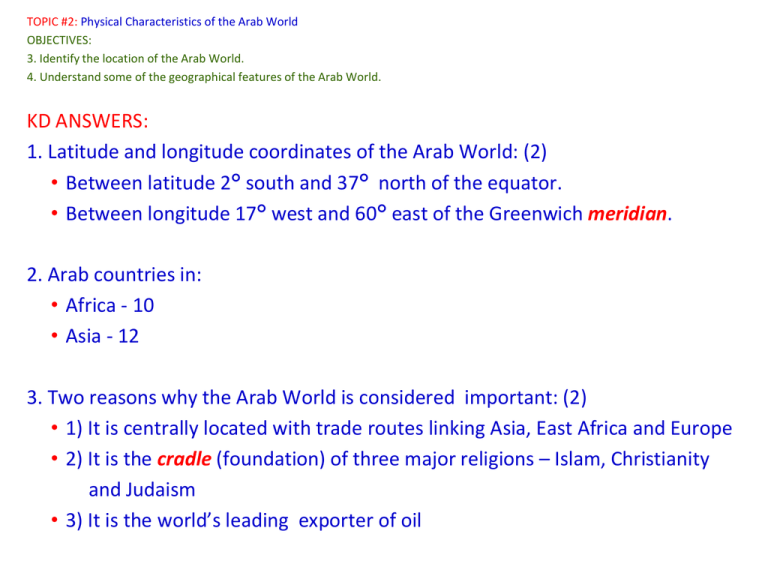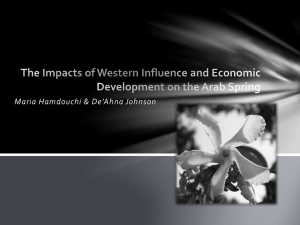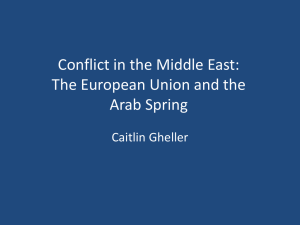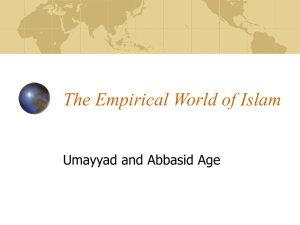1. Web – Physical Characteristics of the Arab World
advertisement

TOPIC #2: Physical Characteristics of the Arab World OBJECTIVES: 3. Identify the location of the Arab World. 4. Understand some of the geographical features of the Arab World. KD ANSWERS: 1. Latitude and longitude coordinates of the Arab World: (2) • Between latitude 2° south and 37° north of the equator. • Between longitude 17° west and 60° east of the Greenwich meridian. 2. Arab countries in: • Africa - 10 • Asia - 12 3. Two reasons why the Arab World is considered important: (2) • 1) It is centrally located with trade routes linking Asia, East Africa and Europe • 2) It is the cradle (foundation) of three major religions – Islam, Christianity and Judaism • 3) It is the world’s leading exporter of oil KD: 4. Fill in this paragraph and paste into your exercise book. p. 15 - 18 The three basic surface features of the Arab World include plains, plateaux and mountains. The two types of plains are Coastal Plains and Flurial Plains. Kuwait rests on a costal plain. Plateaux are flat or nearly flat areas of high ground which have steep sides and stand above the surrounding area. At the center of the Arabian Peninsula is the Najd plateaux. There are four main mountain ranges in the Arab World. The Atlas Mountains extend across Morocco, Algeria and Tunisia. The Oman Mountains include Jebel Akhdar (the Green Mountains) which is over 3,000 metres tall. In Western Saudi Arabia you can find the Asir and Al Hejaz Mountains, both over 2,500 metres high. The Lebanese Mountains are famous for snow-skiing and reach over 3,000 metres. TOPIC #2: Physical Characteristics of the Arab World OBJECTIVES: 3. Identify the location of the Arab World. and 4. Understand some of the geographical features of the Arab World. SKILL DEVELOPMENT ANSWERS: 1. Highest elevation: (2) • Toubkal at approximately 4,000 metres. 2. Width of the Arab World: (1) • Approximately 7,900 kilometres 3. Estimate Kuwait’s elevation. Explain why you chose that number. (3) • 0 - 200 metres • Kuwait lies along the Arabian Gulf, is mostly flat and is well-below the 1,000 metre mark on the scale. TOPIC #2: Physical Characteristics of the Arab World OBJECTIVES: 5. Describe the climate conditions in the Arab World. and 6. Identify the types of vegetation in the Arab world. KD ANSWERS: 2. Three factors effecting climate in the Arab World: (3) • Latitude – distance from the equator • The balance between land and water • Altitude – elevation from sea level 3. Match each of the climate zones to its description. (3) Mediterranean Desert Tropical Tropical ______________ It is very hot and rainy throughout the year. Found in Sudan and Somalia. Desert ______________ It covers most of the Arab World and is characterised by high temperatures with limited amounts of rainfall. Mediterranean It has warm and rainy winters and found in North Africa and ______________ Lebanon. TOPIC #2: Physical Characteristics of the Arab World OBJECTIVES: 5. Describe the climate conditions in the Arab World. and 6. Identify the types of vegetation in the Arab world. KD ANSWERS: 4. Vegetation is the type of plants growing in a particular place. Three types of vegetation in the Arab World. Type of Different Kinds Vegetation Forest - 9% • Tropical Rain Forest – include ebony, teak and mahogany trees • Mixed Forest – includes cedar and cork trees Grassland – 18% • Savanna – includes lush elephant grass on which cattle and buffalo feed • Temperate – includes flowering herbs for sheep and goats Desert 70% + • Has limited grasses, scrub and cactus











